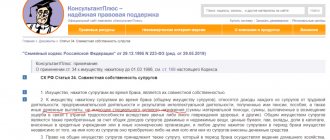One way to purchase your own home is to use maternity capital funds. In 2021, its value for the first child is 483,882 rubles, for the second – 639,432 rubles. Of course, it is unlikely that you will be able to buy an apartment or house with this money. But they may well be enough to buy out a share in the apartment. The law allows you to buy out a share of real estate even from relatives. But before concluding such a transaction, it is worth familiarizing yourself with the peculiarities of its execution.
What are the features when buying a share of an apartment using maternity capital?
All issues relating to the management and distribution of public money, in particular maternity support, are regulated at the legislative level.
A family that has the right to maternity capital can use the allocated funds to solve the housing problem in only two ways:
- In the case where part of a residential apartment being considered for purchase is completely isolated from the rest of the home. This can be one or several separate rooms in a multi-room apartment. It is not possible to purchase a part (share) in a one-room apartment. This is due to the lack of opportunity to allocate a part of it separate from the occupied premises. And the law provides for the possibility of improving living conditions only by obtaining ownership of an independent living space.
- If the purchase and sale agreement allows the owner of the capital to become the owner of the entire premises.
Such transactions take place under the special control of the Pension Fund (PFR), which is obliged to monitor compliance with all nuances, in accordance with the law. There are certain requirements for the selected part of the living space, compliance with which allows us to consider it as an option for using maternal capital. The isolated part of the apartment must be completely habitable. This concerns its full compliance with technical and sanitary standards.
There is no unified scheme for considering applications to the Pension Fund regarding the purchase of a share in an apartment. In each individual case, specialists will study the issue individually. And only the decision they make will become the legal basis for such a transaction.
The issue of registration of the selected share of living space will also be important. Before the transaction, this part must already be separated from the rest of the apartment, recognized as residential, with all communications necessary for life.
As a result of the purchase, the apartment will have two legal owners, which will later give the family the opportunity to buy the remaining part of the home if the second owner wants to sell. Such cases are considered positive in terms of improving living conditions, which may influence the decision of the inspecting party. After completing the transaction and transferring funds, the owners are issued a certificate indicating that they own a share, and not the entire living space.
Buying a share in an apartment is possible not only from strangers, but also from relatives. However, such an agreement, where maternity capital will be used, has a lot of its own characteristics. According to regulations, such transactions have legal grounds. But in order for the Pension Fund to give the go-ahead for such a purchase, you must remember:
- The controlling government agency will allow such an acquisition only if the procedure for using the housing will be significantly changed in the future. This point is important, since very often transactions between relatives are carried out with the aim of cashing out state support funds for families with children. Such fraud is fraud, which is punishable by criminal liability, and all completed transactions are canceled.
- The Pension Fund may allow the purchase of part of the housing if the remaining family members officially renounce their shared ownership.
- You cannot buy a share in an apartment from your spouse using the certificate funds. However, transactions between children and parents are within the law and are not prohibited.
Personal income tax refund
In some cases, when purchasing a share from relatives, you can qualify for a tax deduction, but on the condition that the transaction will not be executed between interdependent persons (husband, wife, grandfather, grandson, etc.).
Options for purchasing part of an apartment using funds from maternity capital from strangers must comply with the requirements of the law. As for the purchase of a room in a hostel using state support, permission for such a transaction can only be obtained if the property is transferred to private housing and is not subject to alienation.
Is it possible to buy a house or apartment from a relative for maternity capital?
Photo by Pexels
The procedure for providing state support measures in the form of maternity capital funds is regulated by the Federal Law of December 29, 2006 No. 256-FZ “On additional measures of state support for families with children.” In particular, Part 3 of Article 7 of this regulatory document provides a list of possible options for the direction of MK, one of which (clause 1) is improving housing conditions.
And Article 10 of this law establishes in detail the types of improvement of living conditions of families with children for which maternal capital can be used. According to the law, it is permissible to purchase residential premises through any civil transactions, if they do not contradict the law.
That is, the law does not contain a direct prohibition on purchasing housing from a relative using maternity capital , but there are a number of conditions that must be met in order for the transaction to be recognized as legal.
The law describes a number of conditions for conducting a transaction for the purchase/sale of housing using maternity capital. Including:
- the premises must be residential, not dilapidated or in disrepair, and have communications;
- real estate must be located on the territory of the Russian Federation, and you can buy housing in any region; it is not necessary to purchase it at your place of registration;
- within six months after the transaction or removal of the encumbrance (in case of purchase with a mortgage), the housing must be registered as shared ownership, shares are allocated in proportion to the cost of housing and funds invested at the expense of maternal capital;
- the parties do not have mental disorders and are legally competent (both the seller and the buyer).
The law does not contain requirements regarding the category of sellers for such transactions, which means that the Pension Fund of the Russian Federation has no grounds for refusing to transfer MK if family ties of the certificate holder with the real estate seller are discovered.
How to purchase a share in an apartment using maternity capital
There are several legal options for purchasing part of an apartment using funds from the state support fund. Below we will talk about their main advantages.
Through the property owner
This concerns the conclusion of a purchase and sale agreement with the property owner. The procedure involves cashless payment, therefore, after receiving permission for the transaction, the amount will be transferred to the seller’s bank account by the Pension Fund.
However, in this case, there are temporary restrictions on the right to use maternal capital. Thus, purchases using public funds will be possible only when the child reaches three years of age.
Purchasing part of a home through a bank
In this case, housing is purchased with a mortgage. In this option, the funds will go to the seller from a credit institution, and repayment will be made from the amount of state support. An advantage of this option is the possibility of using maternal capital without waiting for the child to reach three years of age. As practice shows, banks often accommodate young families by working on a loan repayment scheme using maternity capital.
Advice. You are more likely to expect approval from a credit institution if the acquisition of a share allows the borrower to become the full owner of the entire apartment in the future. Because this reduces the risk of non-return of allocated funds.
Registration of part of the living space after acquisition will require the allocation of shares in the room/rooms for each family member, including children. Divide the living space into at least three parts. The size of the shares is determined by agreement between the parties to the transaction. In this case, the official allocation of shares for each family member must be made no later than six months from the date of the transaction.
Possible liability
After the transaction and the transfer of funds to the seller, Pension Fund employees can monitor the fate of the sold property for some time, for example, check whether all family members were actually included in the list of shareholders, and whether the family actually lives in the purchased property (by the way, residence is not required condition). If it turns out that the alienation turned out to be fictitious, and its purpose was to cash out and receive funds from maternity capital, the case materials will be transferred to law enforcement agencies to initiate a criminal case on the fact of fraud.
Stages of buying out a share in an apartment using maternity capital
Since payment under the share purchase and sale agreement is made by the Pension Fund directly to the seller, it is important to comply with all the mandatory stages of preparing and conducting the transaction. The sales documents indicate that funds for payment come from state support, so issues regarding approval can be resolved by specialists within several months, but no more than three.
The first stage of buying out a share is collecting all the necessary documents. To complete the transaction you will need:
- data of the parties to the contract;
- information about real estate;
- share value;
- funds transfer scheme;
- the procedure for transferring ownership of part of the home to a new owner.
All documents must be submitted to the Pension Fund, which will carry out the verification, and in case of a positive decision, the transfer of money. To consider an application for redemption of a share, the applicant will need to provide:
- passport and SNILS;
- certificate for maternal capital;
- documents on marital status and presence of children;
- application for disposal of materials;
- an extract from the Unified State Register of Real Estate for part of the apartment;
- notarial obligation to allocate a share;
- contract of sale.
Upon expiration of the established period, the fund will make a decision on refusal or payment of financial assistance to improve housing conditions. Registration of ownership of shares is carried out in Rosreestr. This requires the presence of two parties to the contract.
What other conditions must be met?
The most important and first thing is that maternity capital funds can be used to improve living conditions only after the child turns 3 years old. This refers to a child whose birth gave the family the right to receive maternity capital.
A way around this condition is to contact consumer cooperatives and receive loans against capital. This is quite legal and is in great demand, but for the “services” the cooperative will definitely take its percentage, and most often – not a small one. The second method is a purchase with deferred payment, when part of the funds is contributed from one’s own budget, and the remainder is specified in the contract and transferred by the Pension Fund after the child turns three years old. In this case, it is necessary that the standard contract for the purchase and sale of an apartment with deferred payment be filled out in accordance with all the rules, otherwise the Pension Fund of the Russian Federation may refuse to transfer funds subsequently (the right to maternal capital will remain, the seller will simply not receive the money).
By the way, buying with a deferment for a transaction with relatives is practically an excellent option, because it is the long-term nature in this case that confirms the seriousness of intentions.
Another condition is the mandatory registration of purchased housing as shared ownership . That is, among other documents, the buyer is obliged to provide the Pension Fund with a written undertaking to register the purchased property as shared ownership of all family members. There is a six-month period for fulfilling the obligation, after which the Pension Fund has the right to conduct an inspection, and if the obligation is not met, open a criminal case against the owner of the certificate for maternal capital.
This leads to the following problem: children are indirectly involved in the transaction, and according to the law, a compensated property transaction in principle cannot be carried out between a minor child and his close relative. In this case, relatives are meant:
- directly the child’s parents themselves;
- stepfather or stepmother in relation to the child;
- adoptive parents in relation to adopted children;
- grandfather or grandmother in relation to grandson/granddaughter;
- brothers or sisters in relation to each other, including not full-blooded, that is, having a relationship through only one of the parents.
That is, based on this, the following is obtained: the seller can only be a relative who is not in direct connection with the buyer himself or his children (future co-owners of the property). You cannot purchase a house or apartment from your child’s older adult sister, his grandmother, etc. using maternity capital.
However, this condition can also be bypassed: simply, only one of the spouses acts as the buyer. The transaction is carried out as follows:
- the second spouse writes consent to purchase a house for maternity capital;
- a purchase/sale transaction is carried out, during which the spouse becomes the sole owner of the property;
- the ownership right is registered in Rosreestr (today it is not necessary to do this yourself; the notary’s office also helps to register the right to an object in Rosreestr through a system of interdepartmental interaction);
- an obligation is drawn up (also with a notary) that the buyer undertakes to allocate the shares to the children and the second spouse within six months from the date of transfer of funds by the Pension Fund of the Russian Federation;
- After this, the buyer, with ready-made documents, contacts the Pension Fund and writes an application for the disposal of maternity capital funds.
It turns out that children are not involved in the transaction, which means it cannot be considered illegal.
When parents purchase with the participation of children (that is, their direct participation in the transaction, when the whole family is the buyer), there is a risk, because such a transaction is a priori invalid. And, the fact of relationship can only be discovered theoretically (For example, if well-wishers write to the authorities, etc.). But that comes later, after the deal. The Pension Fund itself will not establish such family ties, simply because the agency does not have such powers.
Refusal to acquire shared ownership
Situations cannot be ruled out when inspecting government agencies decide to refuse compensation for the costs of purchasing a share from maternity capital. The main reason for refusal in most cases is the prioritization of purchasing the entire property rather than part of it.
If there were no other legal grounds for refusal, the owner of the certificate for maternal capital has the right to appeal such a decision in court. However, compliance with all recommendations, as well as the absence of fraud in the case of using state support funds, practically excludes the possibility of making a negative decision on the purchase of a share in the apartment.
Since purchasing part of the living space with the help of maternity capital has its own nuances, buyers may need advice from real estate specialists, lawyers, and Pension Fund employees.
Documents for the Pension Fund
The list of documents that must be transferred to the Pension Fund for full or partial payment of the purchased share was approved by Government Decree No. 862 of December 12, 2007. In particular, it includes the following documents:
- Passport of the certificate holder, as well as the passport of his spouse.
- Marriage certificate (if available).
- Child's birth certificate.
- SNILS of the person who submits the application.
- Maternity capital certificate (in original).
- A copy of the purchase and sale agreement, which provides for deferred payment.
- Extract from the Unified State Register of Real Estate.
- A receipt issued by the seller, which indicates the full cost of the share, the amount that the buyer has already contributed, and the amount that is to be paid additionally using maternal capital funds.
- A certificate from the Criminal Code confirming the absence of utility debts for the share that is transferred to the new owners.
- An undertaking certified by a notary for the mandatory allocation of part of the housing to the spouse and child within 6 months (if this part was not allocated immediately for some reason).
If both maternity capital and borrowed funds are used to pay for the share, you will also need to provide a copy of the loan agreement and a certificate from the bank about the balance of the debt.
Despite the fact that the law does not prohibit the purchase of shares from relatives using maternal capital, in practice people often encounter refusals from Pension Fund employees. If the family considers such a refusal illegal, it can be appealed in court. It happens that the applications of certificate holders are indeed rejected without reason, and the judicial authorities take the side of the plaintiff.
Dear site visitors! Due to regular changes in legislation, information sometimes becomes outdated faster than we can update it. All cases are very individual and basic information does not guarantee a solution to your specific problem. Therefore, online consultants work for you on the site around the clock, to whom you can ask any questions!
How to obtain permission from the Pension Fund of Russia
To cash out maternity capital, you will need a written application to the Pension Fund.
This can be done at the branch at your place of residence. When drawing up, you need to take into account the need to substantiate your claim. Those. The certificate holder must state the reasons clearly. For example, a neighbor in a communal apartment intends to sell his room, and the family needs additional square meters of housing. The applicant will additionally need the following documents when applying:
- general passport;
- if a woman is married, a certificate of marriage and a civil passport of the spouse are required. If the applicant is divorced, a divorce certificate is required;
- a certificate that grants the right to receive maternal capital;
- children's birth certificates. If they have reached the age of 14, their general passports are additionally required;
- documents on the legal status of the purchased property;
- documents on the technical condition of the purchased property.
You can submit an application not only at the Pension Fund branch, but also through the MFC. It will be considered for a maximum of a month. During this period, documents will be checked, and perhaps fund employees will inspect the housing on site. After the inspection is completed, a written decision will be made.
If it is positive, the required amount will be transferred to the seller’s account. Details should be indicated in the application.
If the Pension Fund refuses to purchase a share
Any refusal to cash out maternity capital must be provided by Pension Fund employees in writing. It will contain the rationale, i.e. indication of all reasons for refusal with references to current legislation.
If the owner of the certificate decides that the refusal is unmotivated and illegal, he can file a claim with the district (city) court at the location of the PFR branch. This must be done within three months after submitting a written reasoned decision to refuse.










